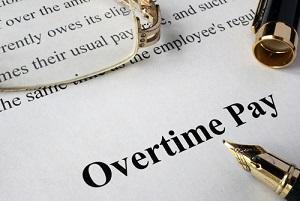
 847-995-1205
847-995-1205
Recent Blog Posts
New FLSA Overtime Regulations May Require Revising Your Pay Structure
 If you have owned your business for any reasonable length of time, you have probably had to deal with some of the complexities of hiring a staff and compensating your workers in accordance with local, state, and federal regulations. Many of your employees—including many frontline customer-facing workers—are probably paid by the hour and are eligible to be paid overtime for every hour over 40 per week. Others, however—including management and other designated positions—may be exempt from federal overtime requirements, meaning they earn a specific salary per year.
If you have owned your business for any reasonable length of time, you have probably had to deal with some of the complexities of hiring a staff and compensating your workers in accordance with local, state, and federal regulations. Many of your employees—including many frontline customer-facing workers—are probably paid by the hour and are eligible to be paid overtime for every hour over 40 per week. Others, however—including management and other designated positions—may be exempt from federal overtime requirements, meaning they earn a specific salary per year.
Employers whose staff includes exempt employees must be prepared for upcoming changes set forth by the Obama administration and the Department of Labor. The regulations were announced this past spring and are set to take effect on December 1, 2016.
Criteria for Exempt Status
In order for you to consider an employer to be exempt from the overtime requirements contained in the Fair Labor Standards Act, there are certain criteria that must be met. An exempt employee must:
Former Employees File Class Action Against Wells Fargo
 Over the last few weeks, financial giant Wells Fargo has come under fire in the national media for creating millions of unauthorized accounts on behalf of unsuspecting customers. The company recently settled with the Consumer Financial Protection Bureau over the matter, agreeing to pay $185 million in penalties and fines in addition to more than $2.5 million in restitution to its clients. Now, however, the company is facing a lawsuit from another direction, as two employees have filed a class-action suit on behalf of all former workers penalized by Wells Fargo for failing to make unrealistic sales goals.
Over the last few weeks, financial giant Wells Fargo has come under fire in the national media for creating millions of unauthorized accounts on behalf of unsuspecting customers. The company recently settled with the Consumer Financial Protection Bureau over the matter, agreeing to pay $185 million in penalties and fines in addition to more than $2.5 million in restitution to its clients. Now, however, the company is facing a lawsuit from another direction, as two employees have filed a class-action suit on behalf of all former workers penalized by Wells Fargo for failing to make unrealistic sales goals.
Quiet Victims
The lawsuit was filed in a California court last week alleging that the sales quotas set by Wells Fargo were “unrealistic,” “unreachable,” and “impossible” without engaging in illegal and unscrupulous practices. While the company has now been called out on such illicit practices, the current action looks to address the needs of workers who refused to break the law and subsequently failed to make their quotas.
Sudden Closing of Chicago Restaurant Attributed to Minimum Wage Increases
 After less than a year in business, a Mexican restaurant in the Chicago neighborhood of Andersonville suddenly announced that it was closing. The owners of Cantina 1910 reportedly sent an email to employees late Sunday night indicating that the restaurant would be closing effective immediately. A statement posted to Facebook the next morning cited rising payroll expenses, including Chicago's increasing minimum wage, as the owners' primary reason for their decision.
After less than a year in business, a Mexican restaurant in the Chicago neighborhood of Andersonville suddenly announced that it was closing. The owners of Cantina 1910 reportedly sent an email to employees late Sunday night indicating that the restaurant would be closing effective immediately. A statement posted to Facebook the next morning cited rising payroll expenses, including Chicago's increasing minimum wage, as the owners' primary reason for their decision.
Abrupt Ending
According to reports, employees of Cantina 1919 received an email notification at the end of service on Sunday night stating that the modern establishment would not be reopening for business. The news reportedly came as a shock to workers, many of whom were just getting home after their closing shifts. The next morning, the owners posted a statement to social media in an attempt to provide some insight into their decision.
Illinois Appeals Court Rules Movers Are Not Independent Contractors
 When your business requires extra hands, you have two choices. You can hire employees or you can enter into contractual agreements with independent contractors. As you probably are aware, there are advantages and disadvantages to each, and it is important to choose the one—or the appropriate combination of the two—that best meets your company's needs. The challenge, however, is that it is up to you as a tax-paying business owner to classify your workers properly in accordance with state and federal law, as failure to do so can result in serious financial penalties.
When your business requires extra hands, you have two choices. You can hire employees or you can enter into contractual agreements with independent contractors. As you probably are aware, there are advantages and disadvantages to each, and it is important to choose the one—or the appropriate combination of the two—that best meets your company's needs. The challenge, however, is that it is up to you as a tax-paying business owner to classify your workers properly in accordance with state and federal law, as failure to do so can result in serious financial penalties.
Moving Company Claims Movers Are Contractors
Last month, an Illinois appellate court issued a decision in a case that has been ongoing since 2009, when a former worker for the moving company filed for unemployment benefits. The Illinois Department of Employment Security realized, at that point, that the moving company had not reported any of the worker's wages. Looking further, the Department discovered that approximately 90 other drivers and physical laborers should have been listed as employees but were not.
Car Wash Employees Win $1.65 Million Wage Theft Settlement
 As a conscientious employer, you realize that your staff deserves to be compensated fairly for their contributions to your business. In some industries and companies, fair compensation may be at or near the minimum wage set by the federal, state, or local government, while in others, fair compensation is much greater than that. Some employers, it seems, are willing to ignore labor laws in the interest of increasing their bottom line, but as a recent settlement in New York shows, getting caught can be a costly proposition.
As a conscientious employer, you realize that your staff deserves to be compensated fairly for their contributions to your business. In some industries and companies, fair compensation may be at or near the minimum wage set by the federal, state, or local government, while in others, fair compensation is much greater than that. Some employers, it seems, are willing to ignore labor laws in the interest of increasing their bottom line, but as a recent settlement in New York shows, getting caught can be a costly proposition.
Long-Awaited Justice
It took more than five years of legal wrangling, but 18 car wash employees from the New York and New Jersey region are set to split a settlement of $1.65 million for wage theft. The settlement was finalized in federal court, and will provide each worker an average of more than $91,000, including emotional distress. All of the workers were Latin American immigrants working at four different car wash locations in New York and New Jersey, all owned by the same company.
Uber Plaintiff Claims He Accepted Settlement Under Duress
 The Uber driver that initiated a lawsuit against the ride-sharing company almost three years ago has come out against the $100 million class-action settlement to which he had previously agreed. The man now believes that the deal was misrepresented to him by his attorneys, and that he was forced to agree to its terms under duress and false pretenses. Still awaiting approval from a federal judge, the settlement would allow Uber to continue to classify its drivers—which the company calls “partners”—as independent contractors rather than employees.
The Uber driver that initiated a lawsuit against the ride-sharing company almost three years ago has come out against the $100 million class-action settlement to which he had previously agreed. The man now believes that the deal was misrepresented to him by his attorneys, and that he was forced to agree to its terms under duress and false pretenses. Still awaiting approval from a federal judge, the settlement would allow Uber to continue to classify its drivers—which the company calls “partners”—as independent contractors rather than employees.
Suit Sought Reimbursement for Mileage, Tips, and Expenses
Throughout the country and around the world, Uber drivers are classified by the company as independent contractors, as drivers are free to set their own schedules and areas of operation within the cities in which they are approved to drive. This means, however, that drivers are responsible for all tax reporting, as well as any and all expenses they may incur. The issue has been broached previously in cases involving accident liability and workers' compensation, but the recent class-action suit was arguably the most widely covered by various news outlets.
Federal Court Rules Employers Cannot Pool Tips to Share With Support Staff
 A decision in the Ninth U.S. Circuit Court of Appeals extended an existing U.S. Department of Labor rule regarding tip-pooling to establishments in which tipped employees already make minimum wage. How employers handle tips intended for bartenders and waitstaff has long been a source of contention, as gratuities often represent a significant portion of such employees' income. While Illinois is not technically under the jurisdiction of the Ninth Circuit, the ruling will still likely have implications as case law precedent.
A decision in the Ninth U.S. Circuit Court of Appeals extended an existing U.S. Department of Labor rule regarding tip-pooling to establishments in which tipped employees already make minimum wage. How employers handle tips intended for bartenders and waitstaff has long been a source of contention, as gratuities often represent a significant portion of such employees' income. While Illinois is not technically under the jurisdiction of the Ninth Circuit, the ruling will still likely have implications as case law precedent.
FLSA Regulations on Tip Credits
The Fair Labor Standards Act (FLSA) permits employers to count tips to certain employees as a portion of those employees' wages, helping to fulfill the employers' obligations of paying minimum wage. The FLSA still requires an employer to pay tipped employees at $2.13 per hour, with the expectation that tips will comprise at least $5.12 per hour in addition. In Illinois, employers must pay tipped employees $4.95 per hour, and tips must bring the employees' compensation to at least $8.50 per hour, the state minimum wage.
Medical Marijuana and the Right to Maintain a Drug-Free Workplace
 With the state's medical marijuana pilot program now into its fifth month of full-scale operation, employers around Illinois are now faced with tough decisions about the application of drug policies in the workplace. Many business owners are not even sure what the law permits them to do concerning workplace use of medical marijuana by legal, registered patients. The Compassionate Use of Medical Cannabis Pilot Program Act does provide some useful guidelines, as you might expect, but the law, ultimately, leaves the decision up to you.
With the state's medical marijuana pilot program now into its fifth month of full-scale operation, employers around Illinois are now faced with tough decisions about the application of drug policies in the workplace. Many business owners are not even sure what the law permits them to do concerning workplace use of medical marijuana by legal, registered patients. The Compassionate Use of Medical Cannabis Pilot Program Act does provide some useful guidelines, as you might expect, but the law, ultimately, leaves the decision up to you.
Who Are Registered Users?
Since the program began—officially in January 2014, but not in practice until November of last year—patients suffering from about three dozen specified medical conditions have been applying to participate. Qualifying conditions include HIV/AIDS, cancer, glaucoma, Parkinson's disease, Crohn's diseases, fibromyalgia and many more. Those who have been approved are permitted to purchase up to 2.5 ounces of marijuana every two weeks from state-sanctioned dispensaries, and, if they remain within the parameters set by the program, are exempt from prosecution for possession and use. Registered users are not immune from prosecution for behavior while impaired, such as driving under the influence.
Department of Labor: Michigan Restaurant Made Staff Pay to Work
 Following an investigation by the U.S. Department of Labor, a federal judge in Michigan has ordered the owners of a breakfast restaurant to pay nearly a quarter of a million dollars in back wages and damages to more than 100 employees. The DOL's Wage and Hour Division determined that the owners were responsible for a number of wage-related violations, including requiring tipped employees to contribute $2 per hour from their tips as a condition of continued employment.
Following an investigation by the U.S. Department of Labor, a federal judge in Michigan has ordered the owners of a breakfast restaurant to pay nearly a quarter of a million dollars in back wages and damages to more than 100 employees. The DOL's Wage and Hour Division determined that the owners were responsible for a number of wage-related violations, including requiring tipped employees to contribute $2 per hour from their tips as a condition of continued employment.
“Requiring employees to hand over part of their tips to their employer poses a serious problem to workers who, in many cases, are already struggling to get by,” said Mary O'Rourke, a local Department of Labor official. “[It] also undercuts those employers that obey the law and pay their workers properly. She and other regulators hope the judgment serves as a “wake-up call” to those looking to take advantage of their workers.
Pay Close Attention to Your Promises Regarding Vacation
 Most employers offer some form of paid time off or vacation days to their full-time employees. It is impossible for most workers to remain reasonably productive without being able to take a day or two to recharge, recreate, or even tend to other demands of life. In the state of Illinois, there is no law or statute that requires you, as an employer, to offer vacation or personal days, but if you choose to do so, it is important to apply your policy evenly to all eligible employees and to fully comply with any and all promises you have made to your team.
Most employers offer some form of paid time off or vacation days to their full-time employees. It is impossible for most workers to remain reasonably productive without being able to take a day or two to recharge, recreate, or even tend to other demands of life. In the state of Illinois, there is no law or statute that requires you, as an employer, to offer vacation or personal days, but if you choose to do so, it is important to apply your policy evenly to all eligible employees and to fully comply with any and all promises you have made to your team.
Policies and Contracts
Whether your vacation policy is listed in each employee's contract or simply as part of a more general employee handbook, you need to understand exactly what you promising each worker. You have the right to decide how many days of vacation may be earned by an employee based on his or her length of service. It is also within your rights to determine that vacation time must be taken within a certain period of time or be forfeited. If you choose to establish such a policy, however, you will need to be sure to provide your employees the reasonable opportunity to take all earned vacation days.
Contact Us


Schaumburg, IL 60173
Phone: 847-995-1205
